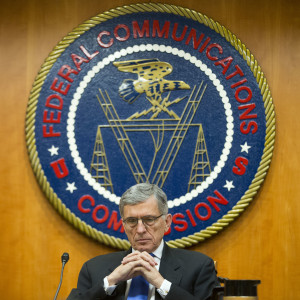As the Federal Communications Commission inches closer to unlocking the set-top box, top lawmakers and advocates on both sides of the aisle have expressed concern about the potential impact of the proposal. But while the statements made by Democrats and Republicans on this issue sound very similar, the mainstream media has described the stances of officials in the two parties using different language.
Senate Minority Leader Harry Reid became the latest and highest-ranking Democrat to weigh-in on this issue last week, urging the FCC to proceed cautiously in remarks the beltway-focused The Hill described as “voicing concerns.”
“Senate Minority Leader Harry Reid (D-Nev.) is voicing concerns with Federal Communications Commission Chairman Tom Wheeler’s plan to open up the market for set-top boxes,” The Hill reported Tuesday.
Two weeks earlier when Reid’s Republican equivalent, Senate Majority Leader Mitch McConnell, expressed strikingly similar sentiments, the same outlet said McConnell’s remarks “echoed an industry argument.”
“In a letter to Commission Chairman Tom Wheeler, he echoed an industry argument that a market without the proposed regulations has led to major innovation in the ways that Americans can watch television,” The Hill report reads.
Reid went on in the June 14 letter to highlight concerns about the proposal’s impact on cable and content providers’ copyrighted material and consumer privacy — concerns content programmers have raised themselves — and asked the FCC to study the rules’ impact before voting to implement them.
“I am concerned that your proposal does not contain mechanisms to ensure that third-party set-top box providers will be required to adequately protect programming content or consumer privacy,” Reid wrote to FCC Chairman Tom Wheeler. “As you continue to pursue greater competition in the set-top box marketplace, I ask you to closely review the impact of this proposal on all affected parties and resolve these issues as you move forward.”
Though McConnell was the first of the two to sound the same alarm, The Hill reported the chief Republican in the upper chamber was out to “criticize” the rules, while its leading Democrat merely “outlined his worries.”
“Rather than applying a light regulatory touch, the FCC would require existing programming distributors to provide the copyrighted programming they have licensed from content providers to third party manufacturers and app developers, none of whom would be bound by the agreements to protect this content,” McConnell wrote to Wheeler and the other four commissioners earlier this month.
Fellow Capitol Hill publication Politico similarly reserves its more aggressive verb choices for the plan’s conservative and industry opponents.
Politico described members of the Congressional Black Caucus’ (CBC) attempt to raise questions about the proposal’s impact on copyright and diversity as “pressing concerns” in its daily technology briefing last month.
“Rep. Yvette Clarke is unveiling a new Multicultural Media Caucus this morning,” a Politco “Morning Tech” newsletter from May reads. “Among its first tasks: Pressing concerns about how the FCC’s set-top box proposal would affect minority programmers.”
Likewise the outlet said CBC members “expressed concerns” in a May letter from lawmakers to the FCC in December asking about the rules’ potential to raise costs and energy bills for consumers while lowering privacy, emergency alert and childrens’ programming safeguards.
“In a letter to the FCC on Wednesday, 21 members of the Congressional Black Caucus expressed concerns about ‘AllVid,’ a universal set-top box standard that would replace the little-used CableCARD,” Politico reported.
In contrast, those same concerns coming from a coalition including the National Cable and Telecommunications Association (which counts Comcast and other pay-TV providers among its members) and the Motion Picture Association of America “hammered Wheeler’s plan” according to Politico.
“The Future of TV Coalition … has hammered Wheeler’s plan, warning that it could hurt diverse and independent programming,” the outlet reported in February.
Politico said feedback from AT&T, which recently acquired pay-TV provider DirectTV, “criticizes” aspects of the plan.
“AT&T also criticizes the lack of a requirement for outside set-top box makers to give subscribers access to all of their pay-TV providers’ channels,” Politico reported.
The FCC’s final comment period on the rules closed in April, and Wheeler has said he intends to bring the measure before the commission for a vote before the end of the year.

